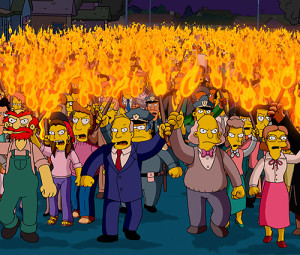I’d like to return to this exchange, in which I hesitated to join Dan’s denunciation of Pam Geller. As we have discovered on HT before, when we have difficulty articulating the terms of disagreement, it’s helpful to take a step back and quibble about methodology. Now, my methodology for free speech issues is always to ask what my hero, Ahmed Aboutaleb, would do. Aboutaleb is the mayor of Rotterdam who made the following public statement to the Charlie Hebdo bombers:
It’s incomprehensible that you turn against freedom like that, but if you don’t like this freedom, for heaven’s sake, get your suitcase, and leave. There might be a place where you belong, and be honest with yourself about that. Don’t kill innocent journalists. And if you don’t like it here because you don’t like the humorists who make a little newspaper — if I may dare say so — just f*** off.
I have been helped in the past few days by reflecting on this post from The Corner by Fred Schwarz, in which he affirms his agreement with a recent public resolution by Charles Cooke to the following effect:
Up until now, I have included in all of my defenses of free speech a preamble in which I have explained what I personally thought of the person I was defending. But having watched the manner in which such qualifications have been used during l’affaire Geller, I shall henceforth do no such thing. Instead, I shall briefly establish that my personal views about a person’s character or cause cannot possibly matter one whit in such a case, and then I shall move on to the only important question at hand — which is whether we are to live as free men, at liberty to speak as we wish, or whether we are to self-censor in the hope that the crocodiles will spare us.
Schwarz adds a number of helpful observations on how, when our affirmation of someone’s free speech rights is accompanied by an execration of their speech, we can be opening the door to arguments against their free speech rights.
I think I am now ready to articulate why my methodology (What Would Ahmed Aboutaleb Do?) leads me to join Cooke and Schwarz against Dan. In free speech law we are familiar with the concept of the “heckler’s veto,” the argument that people with unpopular opinions may have an abstract right to be heard, but threats to public safety prevent our giving them the same free speech protections everyone else enjoys. This is how they used to shut down civil rights marches in the Old South, and it’s often how they shut down legitimate criticism of Islam today. Those of us who support a robust regime of free speech rights recognize the threat posed by the heckler’s veto. If the police can’t keep the peace when unpopular opinion are expressed, that is a confession of incompetence by the police; they should do their damn job. (I can’t remember if it was Mark Steyn or someone else who pointed out how discouraging it is that Salman Rushdie is forbidden to fly because any plane he gets on might be a terrorist target; apparently our security forces are openly admitting that they can’t protect a plane from terrorist attack even when they know with certainty exactly which flight will be targeted.)
I would like to propose a new rule – a corollary to the rule against the heckler’s veto. It is that there should be no “heckler’s stigma.” I formulate the corollary thus:
Irrational mobs that are attempting to destroy free speech rights must not be permitted to dictate which speech we shall condemn as evil, nor the time, place and manner in which we condemn it.
I think Geller and Charlie Hebdo are disgusting, but if I say that in the context of a debate over their free speech rights, I am helping create a “heckler’s stigma” that is, in my view, the next best thing to a “heckler’s veto.” It is that for two reasons: it is intrinsically bad, in that it puts our moral discourse under the control of immoral people; and it creates political and sociological conditions under which legal protections for free speech will lose their political support.
I am Ahmed Aboutaleb!

Pingback: Stigmas And Free Speech | Hang Together
Pingback: Not Every Stigma Is a Heckler’s Stigma | Hang Together